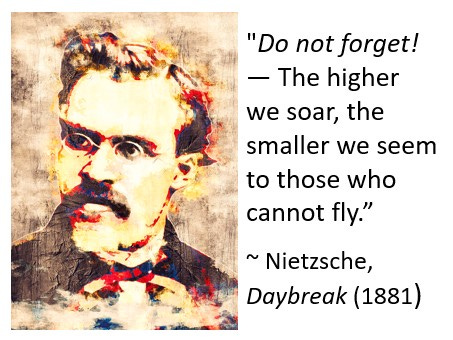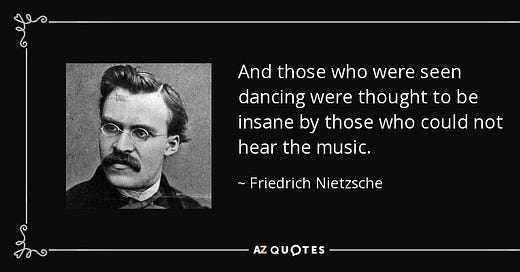This popular quote is making its way around social media, and it’s being attributed to the German existentialist philosopher, Friedrich Nietzsche:
The idea here is that our harsh judgment of others who step out of conventionality is prompted by ignorance. We don’t understand what we are experiencing—we lack context to make sense of it. Instead of activating intellectual humility and accepting that we simply “do not understand,” we fearfully turn to the presumption that there cannot be any sensible rationale for the behavior or belief in question. This “other” and their strange way of being are absurdities without purpose—they are ”insane.”
It’s a beautiful quote that highlights an important idea, but there’s no evidence Nietzsche is the author. One of the oldest printed versions of the quote appears in a London newspaper, The Times of London, in 1927.
"They who dance are thought mad by those who hear not the music. The truth of the old proverb was never more surely borne out that it is just now."
The newspaper identifies the idea as an “old proverb,” indicating that this piece of wisdom was around during and perhaps before Nietzsche’s time.
What’s wonderful about a great idea is that it can stand on its own. Great ideas should not gain greater credibility due to their authorship. The reverse should be true, that an author ought to be better-regarded when they come up with a valuable, original idea. As I wrote in “Confucius Didn't Say That...,”
…a great idea doesn’t need the endorsement of an intellectual celebrity. An idea or argument doesn’t accrue intellectual value based on who authored it. What makes an idea of the past valuable is that it remains helpful in understanding either the past or the present, without undo deference to author’s title or position.”
In that same piece I also explored the causes of misquotations, why I think we should be more diligent in who we attribute ideas to, and argued that we should use great quotes as starting points of dialogue rather than defer to them on account that they purportedly originate from a great thinker. These points are equally applicable here. We should use quotes like the one in question to squeeze out discussion and contemplation. That's when we see the true power and importance of a great idea. The absent author, whoever they might be, do not get the final word.
Nietzsche Could Have Said It
On the one hand, it's unlikely Nietzsche wrote “those who were seen dancing were thought to be insane by those who could not hear the music.” But that doesn’t mean he wouldn’t have agreed with the spirit of the quote.
Nietzsche frequently deployed the metaphor of dance, laughter, and madness to affirm human vitality, creativity, joy, and spontaneity. He viewed his opponents as those who sought to make sense of human suffering and impermanence by looking toward a life-after-life. Such looking over life, towards an unreliably promised afterlife, was a betrayal of human existence and life.
In “On Reading and Writing,” in Thus Spoke Zarathustra, he affirms the love of life and recognizes that “madness” always accompanies love.
“But there is also always some reason in madness.”
Speaking in the voice of the Nietzschean wise-man, Zarathustra, a prophet affirming earthly mortality, creative will and life, he writes:
“…I am well disposed toward life, butterflies and soap bubbles and whatever among men is of their kind seem to know most about happiness. Seeing these light, foolish, delicate, mobile little souls flutter—that seduces Zarathustra to tears and songs.”
Zarathustra then notes,
"I would believe only in a god who could dance.”
The aim of his criticism is the belief that human life is defined by sin and guilt-induced redemption. That we are to live as an apology personified, refraining from the sensual and joyous rhythms beckoning us to dance.
Nietzsche gives a similar criticism of those who embrace perpetual solemnity and fail to recognize the humor and joys of life amidst the pain and absurdity. In section 16 of “On the Higher Man,” from Thus Spoke Zarathustra, he chastised those who viewed life so sternly that they dutifully closed their eyes and bit their lips in resistance to laughter and song. He wrote:
"Avoid all uncompromising people! They have heavy feet and sultry hearts: they do not know how to dance. How could the earth be light to such men?"
Though Nietzsche is not responsible for the insane dancers quote, his book, Daybreak (1881), creatively conveys the same insight. In aphorism 574, near the end of the book Nietzsche writes,

In this metaphor, soaring takes the place of dancing to express living life with spontaneity and creativity. An inability to fly takes the place of impaired hearing to express ignorance and unthinking conformity to conventional belief. Nietzsche invites us to soar—as well as laugh and dance; and to anticipate quizzical scowls—being misunderstood—by those who lack the spirit of flight.
Being Misunderstood
Both of these quotes point us back to Plato’s “Allegory of the Cave,” which we find in The Republic (375 BCE). We’re asked to imagine a group of people have been shackled in a dark cave from the start of their lives. They cannot move their heads and are limited to opening their eyes and seeing what light projects onto the cave walls. Because of their constraints and the ignorance imposed on them by their circumstance, they do not know that shadows on the walls and the muffled voices they hear are but distorted representations of the actual people and voices outside of the cave.
Socrates, through Plato’s work, asks us to consider what it would be like if one of the slaves was forcibly liberated, brought to the surface and into the harsh light of the sun—symbolizing truth. He would experience agonizing pain.
“…compelled to stand up, turn his head, walk, and look up toward the light, he’d be pained and dazzled and unable to see the things whose shadows he’d seen before.”
If his eyes eventually adjusted to the light, he would likely rejoice in not only his freedom but his newfound knowledge. But how would he be perceived among his comrades of the cave? If his eyes had not yet adjusted to the darkness, he would likely have trouble “recognizing the shadows” and would be considered by his former peers. They might conclude that the journey upward—to truth—had actually ruined his eyesight. And if the freed man then decided to liberate the rest of the slaves, they would not only resist him they might even want to kill their would-be liberator. In the words of the dancing-music metaphor, the freed slave wants to share the beautiful “music” he has discovered with others. But they do not hear the music and they think he has lost his mind.
We’re left with two important insights. First, knowledge or wisdom requires us to activate reason and see beneath the surface-level of existence and distinguish between matters of primary significance and those of superficial significance. We must learn to differentiate between what informs and what distracts, what is genuinely connected and what is actually unrelated.
The second insight is that wisdom or knowledge is not always initially pleasant or comfortably compatible with our existing beliefs. The pursuit of truth—and integrity—requires us, at times, to undergo transformation. And transformation, though fulfilling and self-actualizing, is often painful.
We are also likely to be misunderstood by others. They will think that we are strange, foolish, confused, or simply misguided, even as we make the most important progress to enlightenment and achieving integrity. Thus, knowledge of this sort requires more than intellectual aptitude, it also requires humility and courage.
Once again we learn that great ideas in the humanities make indispensable travel companions on our transformative journeys. Let us keep Nietzsche’s words close-in-mind for those days we are misunderstood and appear alien in our own world.
"Do not forget! — The higher we soar, the smaller we seem to those who cannot fly."
If you found this episode interesting, please share it with others and like our post by clicking the heart icon. And be sure to subscribe if you haven’t already.
Speaking Services
Dr. Nall delivers energetic live presentations and engaging workshops on the subjects featured in Humanities in Revolt. Those interested in booking a workshop or talk can get in touch through Facebook or by leaving a comment.
Subscribe
Subscribers will receive periodic posts pertaining to the broad domain of humanistic inquiry, from the insights of great thinkers throughout human history, the meaning and importance of critical thinking and ethics, the underappreciated poetry in everyday existence, to contemporary cultural analysis and the ongoing struggle to combat human oppression and violence. You will also have the opportunity to engage the author and our online community in dialogue about each post.
Why get a paid subscription?
Paid subscriptions directly support Dr. Jeffrey Nall’s efforts to produce and share publicly accessible independent scholarship and analysis. Supporting donations can also be made through PayPal. For more about my work go to JeffreyNall.com and find me on Twitter, Facebook, and Instagram.







Great article! This has also made me reflect on and be more aware of 2 main issues.
Translation: for example Nietzsche's original quote was written in German and even different authors may disagree on how exactly his words should be translated into english. ( https://forum.wordreference.com/threads/to-set-in-sentence-by-friedrich-nietzsche.1905318/ ). When you consider the vast amount of idioms, modes of speaking, formalities, etc that vary across languages, it isn't always straightforward or even sensical to translate the meaning of words literally.
Context (which you definitely hinted at): be it historical, personal, emotional ... so much can only be understood about the meaning of someone's words only in relation to their other thoughts and beliefs. The tools of reasoning must come to life if we are to have any hope of correctly interpreting the meaning of another's words. For example, one Quora user interprets Nietzche's quote to be "... a comment from an inflated ego. Who knows who soars higher and who cannot fly." ( https://qr.ae/pvYnS2 ). Another often-made mistake that I see all the time is viewing the words of yesterday through the lens of today. ( https://www.nodumbquestions.fm/listen/2022/1/13/125-what-do-you-hope-happens ) This is something I am learning more and more to keep in mind whenever I write or post anything on the internet.
Good way to think about things. I'm always concerned about people attributing quotes to people who may not have said them. While I've been known to quote all sorts of people, I try to avoid improperly attributing them as much as possible. But if the insight is important, it doesn't matter who said it. Only in more recent years have we tried hard to offer specificity to quotes of deep influence.